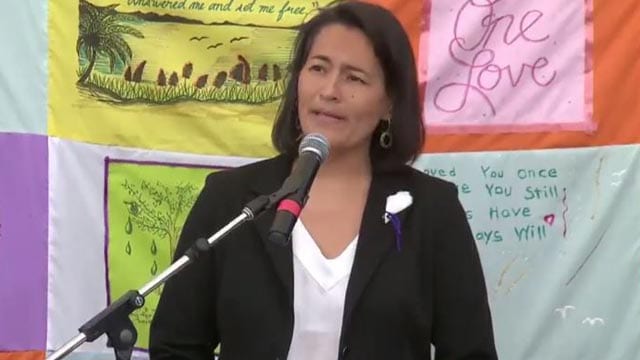
A former commissioner of the National Inquiry into Missing and Murdered Indigenous Women and Girls says Indigenous women across the country face retribution if they speak out against leaders in their communities.
Michele Audette says the inquiry heard many stories from Indigenous people about inappropriate behaviour on the part of their leaders and much of the testimony was done behind closed doors and was not included in the final report “because of the concern, the security or being afraid to speak out, for their safety and the safety of their family.”
“They didn’t say a specific chief but yes they did mention about some people in power or in a leadership position,” says Audette.
The former commissioner says people don’t know where to turn or who to call.
“At the end of the day, we’re still afraid to speak out,” says Audette.
Audette says many leaders are calling for self-government but “where do we go when we want to put in a complaint or there’s allegations?”
She says there must be policies, rules, and transparency.
Audette says, in an ideal world, each organization should have a safe space where individuals can go and understand the process if they do speak out and feel protected.
“And when we talk about an investigation, it needs to be something I understand, I agree and it’s protected so it’s not just a small group that will look and say ‘ok, everything is fine.’”
Audette says there are a number of recommendations in the Calls for Justice that address “de-normalizing violence” and creating safe spaces.
Calls for Justice 4.7 calls upon all governments to “support the establishment and long-term funding of Indigenous-led low barrier shelters, safe space, transitions homes, second stage housing, and services for Indigenous women, girls, and 2SLGBTQQIA people who are homeless, near homeless, deal with food insecurity, or in poverty, and who are fleeing violence or have been subjected to sexualized violence and exploitation.”
Participants in the national inquiry called for community safe spaces.
One perspective shared called for every Indigenous friendship centre to provide access to justice.
“Many people do not feel comfortable asking for help, so you need a service that is confidential and accessible on-site” shared one participant.
“When you denounce, in the community where I’m from, I cannot say everywhere, for sure my family is paying if I do denounce a person or a situation. “So, the collateral damage is huge” says Audette.
“Let’s say because they spoke up, they lost their job in the community or they were expecting renovations or something on housing or education for themselves or it could be for immediate children and they couldn’t have it or they would find out it was refused,” says Audette who adds that sometimes there was violence or damage to property.
“We’ve heard of women and that was a public one in Montreal where she had to move for her safety and the violence that she faced, lateral violence, the physical, the verbal that depression and committing suicide was solutions for her so she had to move herself and her children.”
Audette says some communities are very small and people know “if they speak, they will have to pay or their children or grandchildren and if they don’t speak, they’re suffering.”
She points to a statement in the final report made by Viola Thomas, a former councillor for Tk’emlups te Secwepemc.
“Many of our people are silenced to… take action because of that imbalance of power within our communities and how sexism is really played out. And we need to look at strategies that can remind…. Our men that they were born from mother, they were born from mother earth” reads the quote in the final report.
The Native Women’s Association of Canada is also currently in turmoil.
Earlier this month, the executive council of NWAC suspended its president, Francyne Joe, and appointed an interim president.
Audette, a former NWAC president herself, says all of this is concerning when it comes to pushing for the calls for justice to be enacted as governments could use internal strife as a reason not to work on recommendations with organizations.
The former commissioner says she was already anxious during the inquiry about the recommendations being implemented knowing a federal election was looming and provincial governments were changing.
“I think it’s going to be like this forever for me,” she says.
Audette urges everyone to take the summer to digest and read the MMIWG final report and then challenge all governments and organizations to do something.











When the Europeans came, they refused to trade with the Women. They considered us to be incapable of trade, because they viewed their own women as sub-human, and the weaker sex.
We had to ask our men to step out of their traditional roles as hunters and protectors, and take on one of our roles. As such, our men learned colonial ways due to close contact with European culture. They began to adopt some of these ways, and brought these ideas back to the people.
The solution to this problem is a simple one. Take the power out of the hands of the men, and return it to the Mathriarchs. Let’s get back to the old ways, Circle, so we can deal with these things properly, so the next seven generations do not have to.